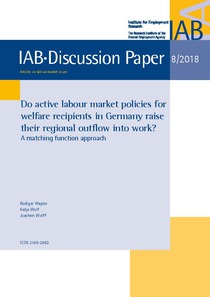Do active labour market policies for welfare recipients in Germany raise their regional outflow into work?
"While many studies estimated the effects of active labour market programmes (ALMPs) on the participants' labour market outcomes, much fewer studies are concerned with effects of these policies on the regional matching-process between job seekers and vacancies. An essential part of many re...
| Main Authors: | , , |
|---|---|
| Institution: | ETUI-European Trade Union Institute |
| Format: | TEXT |
| Language: | English |
| Published: |
Nürnberg
2018
IAB |
| Subjects: | |
| Online Access: | https://www.labourline.org/KENTIKA-19398872124911160549-Do-active-labour-market-polici.htm |
| Summary: | "While many studies estimated the effects of active labour market programmes (ALMPs) on the participants' labour market outcomes, much fewer studies are concerned with effects of these policies on the regional matching-process between job seekers and vacancies. An essential part of many reforms of the unemployment benefit system such as in Germany intended to activate unemployed job-seekers through an intense use of ALMPs. Therefore, it is crucial to understand whether such policies can improve the matching efficiency. We analyse quarterly panel data of German job centres in the period 2006 to 2011 and estimate the effects of the most important ALMPs on the regional exit rate from job-seeking into regular employment in a matching-function framework by applying the system generalized methods of moments estimator. Our results point to positive effects on the matching efficiency of a number of ALMPs, but the effects partly differ between high and low unemployment regions. Only for a few programmes does our evidence point to no or negative effects on the matching efficiency and this may be related to the implementation of these programmes on a very large scale." |
|---|---|
| Physical Description: | 39 p. Digital |

